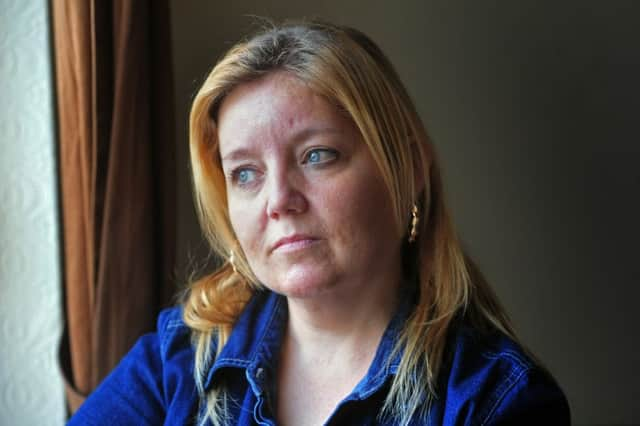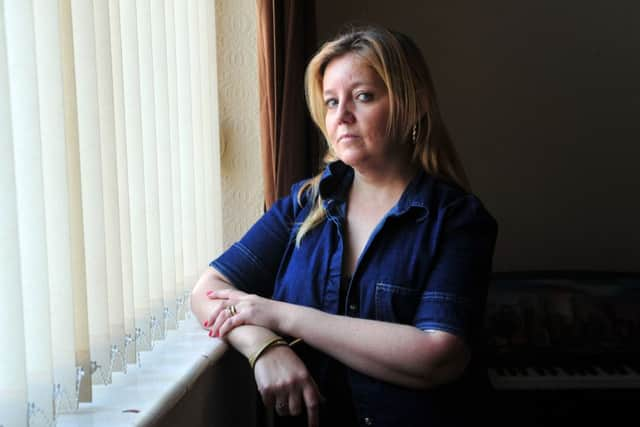What’s it like waiting for an organ transplant?


IT’S called The Wait. A 14-hour film, it shows in real time what it’s like to spend your days waiting for the phone call that will transform your life – or even save it.
It captures a day in the life of 41-year-old Simon Howell, his wife Anita and their children Sarah, eight, and James, three. Born with a serious kidney condition, renal dysplasia, Simon had his first kidney transplant in 2005 thanks to his mother offering to be a living donor.
Advertisement
Hide AdAdvertisement
Hide AdUnfortunately, in 2009, the kidney failed. Simon was added to the transplant waiting list for a new kidney and has been there ever since. For six years he has been waiting for that all important phone call from the hospital telling him they have a donor.


The Wait – part of a new organ donation campaign launched today – aims to highlight the true scale and impact of the donor organ shortage.
We see how Simon’s day is dominated by his illness and punctuated with four life-saving sessions of dialysis, indescribable fatigue and constant uncertainty for the future as he and his family live in hope that a suitable organ will become available.
“I’ve been on dialysis for five years,” he says. “For me, it’s the most difficult part of the wait. Dialysis keeps me alive while I wait for a transplant; but that’s all it does. I’m in limbo.
Advertisement
Hide AdAdvertisement
Hide Ad“My family and I are on a roller coaster and like a roller coaster I can’t see the twists and turns or how it will end. But a transplant would completely transform my health and all our lives.”
There are currently more than 500 people in Yorkshire on the exact same roller coaster as Simon and his family.
Sophie Schofield sits at home in Leeds and prays that the next time the phone rings it’s the hospital telling her a match has been found and to come in for a transplant operation.
What makes the wait all the more agonising for the 35-year-old is that she knows exactly what she’s missing.
Advertisement
Hide AdAdvertisement
Hide AdDiagnosed with renal failure at the age of nine, she has already had three kidney transplants. The last one kept her going for a decade, allowing her to experience the normal life she now craves.
“I almost forgot I was ill,” she says at her home in Moortown. “I lived a completely normal life, got married and had children.
“So when I lost my transplant almost three years ago it hit me like a ton of bricks and turned my world upside down.”
Sophie says she had forgotten what it was like to undergo dialysis. Now she must go into hospital three times a week, have a large needle inserted in her arm and watch as a machine pumps her blood around an artificial kidney for four hours to clean it.
Advertisement
Hide AdAdvertisement
Hide AdShe goes in the evenings to ensure she can spend as much time as possible with her children Brandon, eight, and Jessica, six. But it’s still not easy.
“I’ve explained things as best I can to them, but Jessica gets very upset when I go to dialysis because she’s worried I won’t come home.
“Sometimes it makes me so poorly that I can end up having to go straight to hospital for a week at a time.
“I used to be able to do everything for my children, now I struggle to walk to the shops. My husband Simon has had to become my carer.
Advertisement
Hide AdAdvertisement
Hide Ad“But to look at me you wouldn’t necessarily know anything was wrong. It’s an invisible illness. People just don’t see what you’re going through.
“All you can do is get on with things as best you can. But every time the phone rings your heart stops for a second and you start thinking, is this it? Hopefully one day it will be.
“I had 10 wonderful years, I couldn’t have asked for anything more. It really was the gift of life. Thinking I could have that again is what keeps me going and gives me hope that one day the phone will ring and it will be the hospital saying they’ve got a match.”
“The average waiting time for a new kidney is 1,114 days,” muses another patient, Alyson Symons. “I’m on day 454 – not that I’m counting.”
Advertisement
Hide AdAdvertisement
Hide AdLike Sophie and Simon, the 37-year-old from Addingham, near Ilkley, knows only too well how it feels to wait for the organ that could transform her life.
Alyson, who is single and works as a part-time Post Office counter clerk, has been on dialysis since the age of 20. Her father, David, donated her one of his kidneys in 2001 and, for 14 years, life was “absolutely wonderful”. “I love to travel and went to Australia three times,” she says. “I was able to go back to work and it just gives you your life back.”
Now, that kidney having failed, she is waiting for another donor organ to become available. But it’s not just her own plight that occupies her thoughts.
“Obviously it’s an anxious time because you don’t know when, or if, the call will come.
Advertisement
Hide AdAdvertisement
Hide Ad“But at the back of my mind, with my dad having given me my first kidney, I think about where my kidney could be coming from.
“Obviously there’s a good chance it’s from someone who has passed away. I spend a lot of time hoping that if that is the case the person hasn’t suffered. My thoughts are with their family as well.
“I can’t imagine what it must be like and to be asked the question, ‘would you like to donate their organs?’ I think they are amazing people to think of others during their grief.
“It’s just sad that a precious life has to end so that another life can continue. It really is such an amazing gift.”
The reality is that without such gifts, people die.
Advertisement
Hide AdAdvertisement
Hide AdStatistically, more than one in 10 people on the waiting list will pass away before they get the transplant they need. For some organs, the picture is significantly bleaker. More than one in four people waiting for lungs will die.
In Yorkshire, more than 160 people have died in the last four years because they didn’t get transplants in time.
Simon Howell, the subject of The Wait, says: “Waiting for a transplant is not like waiting for anything else. You don’t necessarily get nearer to the top of the list the longer you’ve been on it. It depends on many factors, including who is in greatest need and who is the best match for an organ. It’s an endless wait with no ETA.”
Sally Johnson, NHS Blood and Transplant Director of Organ Donation and Transplantation, says it’s time we put ourselves in the shoes of people like Simon, Sophie and Alyson and gave serious thought to joining the register.
Advertisement
Hide AdAdvertisement
Hide Ad“I’m sure we’d all hope an organ would be available to help someone we love – so shouldn’t we all pledge to be organ donors so more lives can be saved?”
“I think people intend to sign the organ donor register but never quite get round to it,” says Sophie Schofield. “But it takes two minutes online and just by doing that you have already potentially saved nine people’s lives.
“It really is an amazing thing to do, and I know the difference a transplant makes to someone’s life.”
In the meantime, all Sophie, Alyson, Simon and so many others can do is wait for that phone call.
Age no barrier to joining register
Advertisement
Hide AdAdvertisement
Hide AdJust under 22 million people in the UK have already signed up to the NHS Organ Donor Register.
Each has done so to record their decision to donate organs and/or tissue after their death for transplantation.
Anyone can join the register. Age isn’t a barrier to being an organ or tissue donor and neither are most medical conditions. People in their 70s and 80s have become donors and saved many lives.
One donor can save or transform up to nine lives and many more can be helped through the donation of tissues.
To watch The Wait and join the Organ Donor Register visit organdonation.nhs.uk. You can show your support on social media by using the hashtag #TimeToSign.